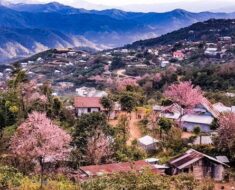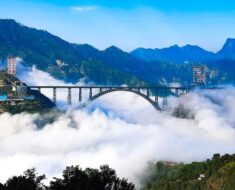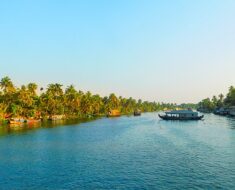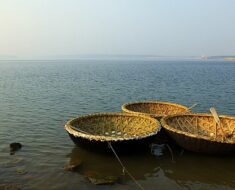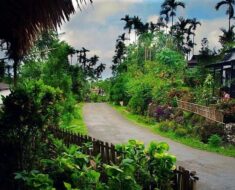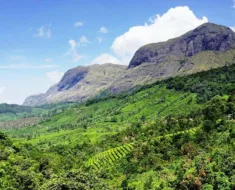Assam is a northeastern state of India and is one of the seven sister states. It is known for its tea plantations, diverse wildlife, traditional cuisine, and vibrant dance forms. It is one of the most populous states among the seven sisters.
Here is a list of amazing facts about Assam
1. Assam – Tea Capital of the world

The northeastern state of Assam is the largest producer of tea and contributes more than 50% of total tea production in India.
Assam is called the ‘Tea Capital of the World’. Britishers were the first to introduce tea plantations in India and Assam was the first state.
Dibrugarh has the largest area under tea cultivation in Assam and is known as the ‘Tea City of India‘.
2. Assam – Kaziranga National Park – Home to one-horned rhinoceroses
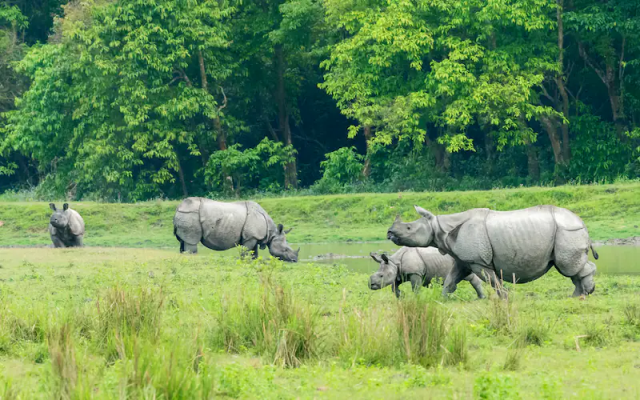
The Kaziranga National Park located in Assam is a UNESCO Natural World Heritage Site. It is regarded as one of the finest wildlife refuges in the world and is home to two-thirds of the world’s great one-horned rhinoceroses.
It is also home to several other endangered species, including the Bengal tiger, the Asian elephant, and the Hoolock Gibbon.
Birdlife International recognizes Kaziranga as an important bird area. It is home to almost 478 distinct bird species which include migratory and resident birds.
Manas National Park a UNESCO Natural World Heritage Site is also located in Assam. It is one of the first reserves included in the network of tiger reserves under Project Tiger in 1973.
Read More: Interesting Facts about Seven Sister States of India
3. Home to the Largest River Island – Majuli
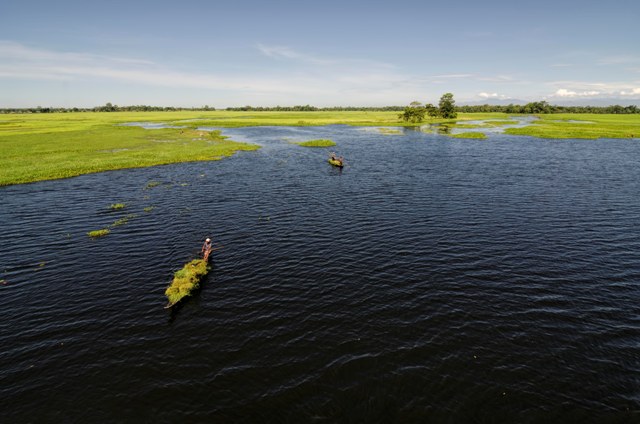
Assam is home to the largest river island in the world called Majuli located on the Brahmaputra river near Jorhat. Majuli in the UNESCO Tentative List for nomination as a World Heritage Site since 2004.
The island is formed by the Brahmaputra River in the south and the Kherkutia Xuti and the Subansiri River in the north and has an area of 1,255 square kilometers (485 sq mi) but lost significant area due to erosion.
Majuli became the first island to be made a district in India in 2016.
The smallest river island is also located in Assam. The Umananda island in the midst of the river Brahmaputra flowing through the city of Guwahati in Assam is the smallest river island. The British named the island Peacock Island for its structure.
💡 Travel Tips: Top Attractions and Places to Visit in Assam
4. Digboi – World’s Oldest Operating Oil Refinery

Assam is home to the world’s oldest operating oil refinery known as Digboi refinery. It is Asia’s first refinery and one of the oldest still in operation,
Digboi refinery is known as the birthplace of the oil Industry in India and was commissioned on 11 December 1901. It is termed the “Gangotri of the Indian Hydrocarbon Sector.”
There is a very interesting story about how Digboi refinery got its name. The British noticed the oil on the feet of elephants returning from the forest after hauling logs. While the labourers dug for oil, the Britishers were known to chant ‘Dig Boy, Dig,’ and that’s how the name Digboi stuck.
Read More: Top 8 Interesting Facts about Nagaland
5. Bihu is Celebrated Thrice a Year
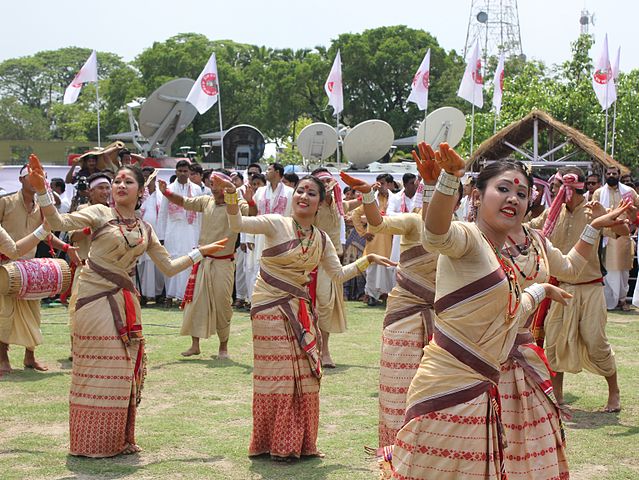
The Bihu festival is the essence of Assam and is celebrated across the state with tremendous zeal and enthusiasm. You will be surprised to know the fact that Bihu is celebrated three times a year.
The festival is a set of three important Assamese festivals ‘Rongali’ or ‘Bohag Bihu’ observed in April, ‘Kongali’ or ‘Kati Bihu’ observed in October, and ‘Bhogali’ or ‘Magh Bihu’ observed in January.
The Rongali Bihu is the most important of the three, celebrating the spring festival.
6. Assam Has Its Own Anthem
Assam has its own state anthem or state song “O Mur Apunar Dekh”. It was written by Lakshminath Bezbarua and composed by Kamala Prasad Agarwala. It was officially adopted as the State Song of Assam at the Assam Student Conference held in Tezpur in 1927.
7. Maa Kamakhya Temple

The majestic Kamakhya Temple situated at the Nilachal hills in Guwahati, Assam is one of the oldest and most revered centers of Tantric practices, dedicated to the goddess Kamakhya.
It is also one of the most sacred shaktipeethas. The temple Kamakhya is believed to be the place where the womb of the goddess fell. Thus, it is also synonymous with supreme female power and fertility.
💡 Travel Guide:
8. Ahom Kings – The Longest continuously Ruling Dynasty

The Ahom kingdom is present-day Assam, India. The kingdom along the Brahmaputra Valley in Assam was governed by the Ahom Dynasty Kings.
Ahom kings ruled the region for nearly 600 years from 1228 to 1826 CE and after that, it was annexed by the British. Thus, making them the longest ruling dynasty in the history of India.
Read More: 8 Amazing Facts about Manipur – The Jeweled Land
9. Longest Railway Bridge in India – Bogibeel Bridge
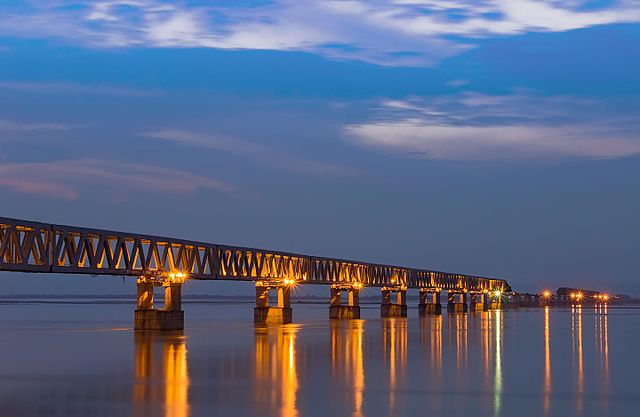
Bogibeel Bridge the Longest Railway Bridge in India is located in Assam between Dhemaji district and Dibrugarh district. It is a combined constructed road and rail bridge over the Brahmaputra River.
It is Asia’s second-longest rail-cum-road bridge and has a length of 4.94 kilometers over the Brahmaputra River.
It is India’s first bridge to have fully welded steel-concrete support beams and can withstand earthquakes of magnitudes up to 7 on the Richter scale.
10. Longest Road Bridge in India – Bhupen Hazarika Setu
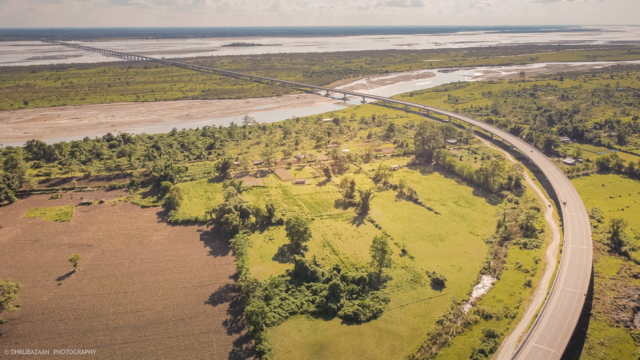
Bhupen Hazarika Setu, the longest road bridge above water in India is located in Assam. It is commonly known as the Dhola Sadiya Bridge which connects the northeast states of Assam and Arunachal Pradesh.
The bridge is built over the Lohit River, a tributary of the river Brahmaputra, and has a total length of 9.15 km.
The bridge is named after Bhupen Hazarika a very prominent and famous artist and filmmaker from Assam.
💡 Travel Tips: 7 Best Tourist Places to Visit in Arunachal Pradesh
Some More Interesting Facts about Assam
- Sualkuchi is known as the world’s largest weaving village located in the Kamrup district of Assam. It is said that every household in the village is directly associated with weaving exotic silk fabrics.
- Assam is famous for its silks like Eri Silk, White Pat Silk, and Golden Muga Silk.
- Rang Ghar in Sivasagar town in Assam, constructed by the Ahom King Swargadeo Pramatta Singha, is one of the oldest surviving amphitheaters in the whole of Asia and has often been referred to as the ‘Colosseum of the East’.
- Dhekiakhowa Bornamghar temple in Assam was established by saint-reformer Madhabdev. In 1528 Madhavdeva lighted an earthen lamp there, which has been burning continuously since then, being refueled with mustard oil by the priests.
- Jagiroad in Assam is Asia’s largest dry fish market. The dry fish are exported to countries like Malaysia, Bhutan, and a few other South Eastern countries.
- Jatinga a small tribal village in Assam has been referred to as one of the most mysterious places in India and is also called the Bermuda Triangle for Birds. It is known for the mysterious suicide of birds during certain weeks of the year.
- Mayong village in Assam is commonly known as the center for black magic, witchcraft, and necromancy.

